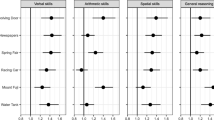Abstract
This article provides an overview of a research program on elementary addition and subtraction word problem solving that has been conducted during the past 10 years at the Center for Instructional Psychology and Technology of the University of Leuven, Belgium. After a brief description of two closely related American research projects, the major findings of the Leuven project are reviewed and discussed. These findings, which derive from the application of a diversity of complementary methods and techniques, concern different aspects of elementary arithmetic word-problem solving, such as the effect of semantic as well as non-semantic task characteristics on problem difficulty, pupils' errors and correct solution strategies, the influence of instructional variables on pupils' solutions, and so forth. Although these outcomes are largely in accordance with the results obtained in the American studies, they also complement them and challenge some of their findings and theoretical viewpoints. The final section of the article summarizes the major theoretical, methodological, and practical implications of the project and gives some perspectives for future research.
Similar content being viewed by others
References
Carpenter, T. P., and Moser, J. M. (1982). The development of addition and subtraction problem solving skills. In Carpenter, T. P., Moser, J. M., and Romberg, T. (eds.),Addition and Subtraction: A Cognitive Perspective, Erlbaum, Hillsdale, NJ, pp. 2–24.
Carpenter, T. P., and Moser, J. M. (1984). The acquisition of addition and subtraction concepts in grades one through three.J. Res. Math. Educ. 15: 179–202.
De Corte, E. (1990). Learning with new information technologies in schools: Perspectives from the psychology of learning and instruction.J. Comp-Assist. Learn. 6: 69–87.
De Corte, E., and Verschaffel, L. (1985a). Beginning first graders' initial representation of arithmetic word problems.J. Math. Behav. 4: 3–21.
De Corte, E., and Verschaffel, L. (1985b). Working with simple word problems in early mathematics instruction. In Streefland, L. (ed.),Proceedings of the Ninth International Conference for the Psychology of Mathematics Education. Vol. 1. Individual contributions, Research Group on Mathematics Education and Educational Computer Center, Subfaculty of Mathematics, University of Utrecht, Utrecht, The Netherlands, pp. 304–309.
De Corte, E., and Verschaffel, L. (1987a). The effect of semantic structure on first graders' solution strategies of elementary addition and subtraction word problems.J. Res. Math. Educ. 18: 363–381.
De Corte, E., and Verschaffel, L. (1987b). First graders' eye movements during elementary addition and subtraction word problem solving. In Lüer, G., & Lass, U. (eds.),Fourth European Conference on Eye Movements. Vol. 1: Proceedings, C. J. Hogrefe, Toronto/Göttingen, pp. 148–150.
De Corte, E., and Verschaffel, L. (1988). Computer simulation as a tool in research on problem solving in subject-matter domains.Int. J. Educ. Res. 12: 49–69.
De Corte, E., and Verschaffel, L. (1989). Teaching word problems in the primary school. What research has to say to the teacher. In Greer, B., and Mulhern, G. (eds.),New Developments in Teaching Mathematics, Routledge, London, pp. 85–106.
De Corte, E., and Verschaffel, L. (1991). Some factors influencing the solution of addition and subtraction word problems. In Durkin, K., and Shire, B. (eds.),Language and Mathematical Education, Open University Press, Milton Keynes, pp. 117–130.
De Corte, E., Verschaffel, L., and De Win, L. (1985a). The influence of rewording verbal problems on children's problem representations and solutions.J. Educ. Psychol. 77: 460–470.
De Corte, E., Verschaffel, L., Janssens, V., and Joillet, L. (1985b). Teaching word problems in the first grade: A confrontation of educational practice with results of recent research. In Romberg, T. A. (ed.),Using Research in the Professional Life of Mathematics Teachers, Center for Education Research, University of Wisconsin, Madison, WI., pp. 186–195.
De Corte, E., Verschaffel, I., and Pauwels, A. (1990). Influence of the semantic structure of word problems on second graders' eye movements.J. Educ. Psychol. 82: 359–365.
Greeno, J. G. (March, 1978).Significant Basic Research Questions and Significant Applied Research Questions Are the Same Questions. Paper presented at the Annual Meeting of the American Educational Research Association, Toronto, ON.
Riley, M. S., and Greeno, J. G. (1988). Developmental analysis of understanding language about quantities and of solving problems.Cognit. Instruc. 5: 49–101.
Riley, M. S., Greeno J. G., and Heller, J. I. (1983). Development of children's problem-solving ability in arithmetic. In Ginsburg, H. P. (ed.),The Development of Mathematical Thinking, Academic Press, New York, pp. 153–196.
Verschaffel, L. (1984).Representatie-en Oplossingsprocessen van Eersteklassers bij Aanvankelijke Redactie-opgaven over Optellen en Aftrekken. Een Theoretische en Methodologische Bijdrage op Basis van een Longitudinale, Kwalitatief-psychologische Studie. (First Graders' Representations and Solution Processes on Elementary Addition and Subtraction Word Problems.) Unpublished doctoral dissertation, Center for Instructional Psychology, University of Leuven, Leuven.
Verschaffel, L., and De Corte, E. (1990). Do non-semantic factors also influence the solution process of addition and subtraction word problems? In Mandl, H., De Corte, E., Bennett, N., and Friedrich, H. F. (eds.),Learning and Instruction. European Research in an International Context. Volume 2.2: Analysis of Complex Skills and Complex Knowledge Domains, Pergamon, Oxford, pp. 415–429.
Zweng, M. (1979). The problem of solving story problems.Arithmetic Teacher 27: 2–3.
Author information
Authors and Affiliations
Rights and permissions
About this article
Cite this article
Verschaffel, L., De Corte, E. A decade of research on word problem solving in Leuven: Theoretical, methodological, and practical outcomes. Educ Psychol Rev 5, 239–256 (1993). https://doi.org/10.1007/BF01323046
Issue Date:
DOI: https://doi.org/10.1007/BF01323046




